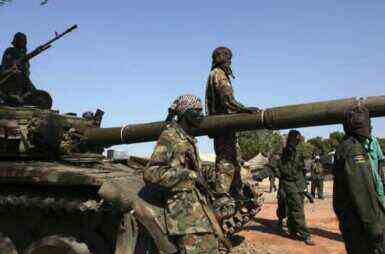S. Sudan’s rival forces trade accusations of clashes in Mundri
February 1, 2016 (JUBA) – South Sudanese rival forces on Monday traded accusations in which each side attempted to blame the other as being responsible for fresh clashes in Mundri area, raising fears of possibility of renewing full scale conflict as the two sides have failed to break the deadlock, despite mounting regional and global pressure on the country’s two main principal leaders to comply with the terms of the peace agreement which they signed in August 2015 to end more than 21 months of a violent conflict.

“Until I received your call, I did not receive any report indicating that our forces have moved out anywhere in areas of their deployments to attack SPLM/A-IO (Sudan People’s Liberation Army) forces. I think this is a usual way of concealing their plans to launch attacks as a way to put pressure when the talks are not making any progress”, said General Riak when reached to comment on reports alleging that government forces in Lanyi, Mundri East area clashed with the government forces over weekend.
Joseph Ngere Pacifo, Governor of the newly established Amadi State and within which the area of clashes falls, confirmed receiving reports of the clashes but said he was still waiting for full details from the commanding officers of government forces in the area.
Pacifo affirmed government’s commitment to implement the peace agreement, adding that government troops were “aware of standing orders to not lift a foot” from their areas to attack armed opposition forces except in self-defense when they have under attack.
But while senior military officers and the government officials at both local and national level denied any knowledge of the attack carried out by the government forces, local residents affirmed that government troops attacked areas known to be occupied by armed opposition forces and accused of them using chemical weapons when they were overpowered in more than two hours clash on Sunday.
Eyewitnesses claimed attack helicopters deployed by government dropped bombs containing gas canisters filled with lethal chemicals in and around opposition held areas west of Juba town and areas located east of Lui, the capital of Mundri East county in Amadi State, Western Equatoria.
Residents also claimed there was evidence strongly suggesting that toxic chemicals dropped by helicopters between 31 January 2016 and February 1, 2016 affected people, with one attack killing innocent civilians, including three children.
The accusation comes weeks after the South Sudanese government and the opposition failed to reach a consensus over the number of states, number of presidential advisors, the way of replacing members of parliament in the event a parliamentary post have become vacant and the number of security and police personnel of armed opposition forces in addition to the size of protection force for senior members of the opposition leaders expected to be deployed in accordance with the provision of the security arrangement matrix which the two side signed in October 2015 in Addis Ababa, Ethiopia.
Local officials claimed that more than 10 government troops and fighters were killed and several others were wounded in the clash which occurred over weekend. The government troops are also reported to be making preparations to take over the area where they were repelled by rebels’ counter-offensive.
Multiple residents said some bombs alleged to have contained the chemicals did not detonate when they landed, but there was a strong smell of chlorine. Local medical personnel are reported to be treating civilians including one infant found in one area. A local medical practitioner told Sudan Tribune on Monday that an old man affected by the bomb died before arriving at Lui hospital. “We tried to treat the others. The children were foaming at the mouth, they were suffocating, and then their hearts stopped. The parents had trouble breathing. We tried to treat them, but they died as well.”
A local activist also told Sudan Tribune on Monday that he had gone to the site where two bombs had landed in a field on 31 January but there was no explosion. Soon afterwards, some civilians and rebel fighters were affected and sought treatment in the area.
“There was a very strong chlorine smell there,” said the activist on condition of anonymity.
“One of the fighters passed away in my presence. It was horrible. My eyes were burning. I wanted to throw up. My skin felt like I had rashes. So I decided to leave the area”, he added”
South Sudanese army received military supplies and equipment recently and experts are saying this has emboldened some military officers and government officials seeking military solution to the conflict.
Run by inexperience pilots, the air force is known for responding to rebel activities by indiscriminate bombing of any area believed to be in opposition control. The bombs normally contain explosives and scrap metal, but in this case there is strong evidence that chlorine gas canisters were employed.
(ST)
